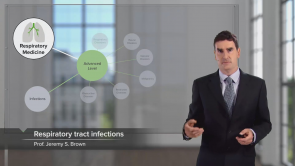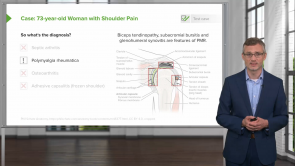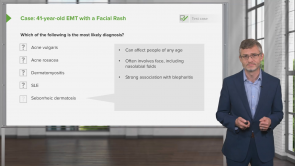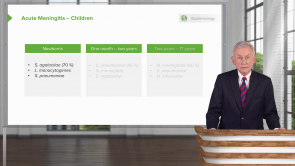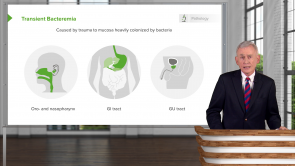Bacterial Meningitis: Management & Empirical Treatment When Gram’s Stain (-)

Über den Vortrag
Der Vortrag „Bacterial Meningitis: Management & Empirical Treatment When Gram’s Stain (-)“ von John Fisher, MD ist Bestandteil des Kurses „CNS Infection—Infectious Diseases“. Der Vortrag ist dabei in folgende Kapitel unterteilt:
- Management – Empirical Treatment When Gram’s Stain (-)
- Empirical Treatment Based on CSF Gram’s Stain
- Management Guidelines
Quiz zum Vortrag
A 61-year-old woman is brought to the emergency department for altered mental status that developed this morning. She has a several day history of fever and productive cough. Two weeks prior, she developed symptoms of acute bronchitis with hoarseness and nasal congestion, which have been slow to resolve. On exam, she is febrile (102°F) and confused. Her pupils are equal, round, regular, and reactive, but she exhibits a left VI nerve palsy. Her lungs reveal dullness to percussion and bronchial breath sounds in the right lower lung field. The heart and abdominal exam is unremarkable, but her neck is stiff and, when flexed, results in bilateral hip flexion. Complete blood count shows a white blood count of 18,000/mm3 with a left shift. Blood cultures are obtained and a lumbar puncture is successfully performed. Which of the following is the most important next step in management?
- Start intravenous ceftriaxone + vancomycin + dexamethasone
- Initiate culture-based antibiotics
- Obtain a brain CT scan
- Start oral amoxicillin/clavulanate
- Obtain Gram stain of sputum
A 35-year-old patient on immunosuppressants for autoimmune disease presents with headache, nausea, vomiting, fever, and meningismus. Physical exam demonstrates bilateral papilledema and positive Kernig and Brudzinski signs. What is the next appropriate step in management?
- Obtain immediate blood cultures and start dexamethasone, ampicillin, ceftriaxone, and vancomycin
- Obtain immediate blood cultures and start vancomycin
- Obtain immediate cerebral spinal fluid cultures and start ampicillin, ceftriaxone and vancomycin
- Obtain brain imaging before performing lumbar puncture
- Obtain cerebral spinal fluid and start appropriate antibiotic therapy based on results Gram stain results
A 14-year-old boy presents with fever, headache, nausea, vomiting, and nuchal rigidity. He recently had a cochlear implant surgery. Which of the following is the most appropriate empiric treatment for the presumed meningitis in this patient?
- Vancomycin, cefepime, and dexamethasone
- Ampicillin, ceftriaxone, dexamethasone
- Vancomycin and dexamethasone
- Ampicillin, gentamicin, dexamethasone
- Cefotaxime, meropenum, ampicillin, and dexamethasone
Cerebral spinal fluid Gram stain shows gram-negative coccobacilli. What pathogens should the patient be treated for until culture is confirmed?
- Haemophilus influenzae and Pseudomonas aeruginosa
- Pseudomonas aeruginosa and Neisseria meningitidis
- Neisseria meningitidis and Haemophilus influenzae
- Streptococcus pneumonia and Listeria monocytogenes
- Listeria monocytogenes and Escherichia coli
A 43-year-old woman had a recent neurosurgery. She now presents with fever, headache, nausea, vomiting, and nuchal rigidity. Which of the following pathogens are the major causes of meningitis in this patient?
- Staphylococci and aerobic gram-negative rods
- Streptococci and staphylococci
- Streptococci and Pseudomonas aeruginosa
- Listeria monocytogenes and group B streptococcus
- Neisseria meningitidis and staphylococci
What is the duration of treatment for Listeria monocytogenes meningitis?
- 21 days
- 10-14 days
- 7 days
- 3 months
- 5 days
Which of the following is an the most appropriate empirical treatment for meningitis in a patient with severe penicillin allergy?
- Meropenem, vancomycin, and dexamethasone
- Ampicillin, ceftriaxone, vancomycin, dexamethasone
- Meropenem, cefotaxime, vancomycin, dexamethasone
- Vancomycin, gentamycin, and dexamethasone
- Vancomycin, ceftriaxone, gentamicin, and dexamethasone
A newborn baby is confirmed to have meningococcal meningitis. Which of the following is the most appropriate antibiotic regimen?
- Cefotaxime
- Ceftriaxone
- Ampicillin and gentamicin
- Vancomycin and cetriaxone
- Carbopenem
Which of the following is the most appropriate antibiotic regimen for neonatal meningitis due to Streptococcus agalactiae?
- Penicillin + gentamicin
- Ampicilin + penicillin
- Meropenem + vancomycin
- Vancomycin + penicillin
- Gentamicin + meropenem
Diese Kurse könnten Sie interessieren
Kundenrezensionen
5,0 von 5 Sternen
| 5 Sterne |
|
5 |
| 4 Sterne |
|
0 |
| 3 Sterne |
|
0 |
| 2 Sterne |
|
0 |
| 1 Stern |
|
0 |
